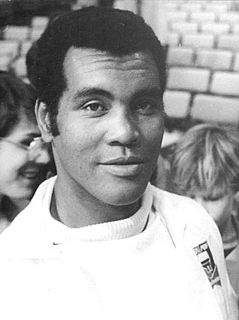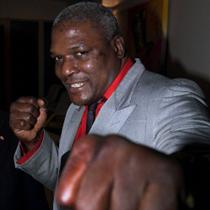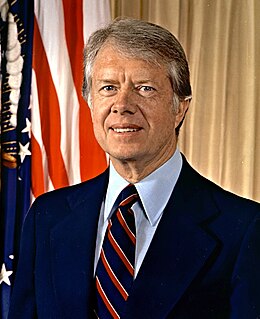
Teófilo Stevenson Lawrence was a Cuban amateur boxer, who competed from 1966 to 1986. He won the Val Barker Trophy (1972) and was honoured with the Olympic Order (1987). Stevenson is one of only three boxers to win three Olympic gold medals, alongside Hungarian László Papp and fellow Cuban Félix Savón. He might have become a five-time Olympic champion had the Cuban authorities allow Cuban boxing team to participate in the 1984 and 1988 Summer Olympics, which they boycotted.>

Ali is a 2001 American biographical sports drama film written, produced and directed by Michael Mann. Other credited producers include Paul Ardaji and Jon Peters. The film focuses on ten years in the life of the boxer Muhammad Ali, played by Will Smith, from 1964 to 1974, featuring his capture of the heavyweight title from Sonny Liston, his conversion to Islam, criticism of the Vietnam War, and banishment from boxing, his return to fight Joe Frazier in 1971, and, finally, his reclaiming the title from George Foreman in the Rumble in the Jungle fight of 1974. It also touches on the great social and political upheaval in the United States following the assassinations of Malcolm X and Martin Luther King Jr.

Trevor Berbick was a Jamaican Canadian professional boxer who competed from 1976 to 2000. He won the WBC heavyweight title in 1986 by defeating Pinklon Thomas, then lost it in his first defense in the same year to Mike Tyson. Berbick was also the last boxer to fight Muhammad Ali, defeating him in 1981.

The Super Fight was a fictional boxing match between Rocky Marciano and Muhammad Ali shot in 1969 and released in 1970. At the time, Ali and Marciano were the only undefeated heavyweight champions in history and fans often debated who would win had they met in their primes. Ali and Marciano were filmed sparring for 75 one-minute rounds producing several possible scenarios for a genuine fight, with the result claimed to have been determined using probability formulas entered into a computer.
Zou Shiming is a Chinese professional boxer who held the WBO flyweight title from 2016 to 2017. As an amateur, Shiming is China's most successful boxer of all time. In the light-flyweight division, he won three consecutive Olympic medals, as well as three World Amateur Boxing Championships gold medals in 2005, 2007 and 2011. In 2018, he has been hired by East China Normal University as a teacher.

Patrick Gerard "Paddy" Barnes, is a Northern Irish professional boxer who challenged for the WBC flyweight title in 2018. As an amateur Barnes represented Ireland at the 2008, 2012, and 2016 Olympics, and Northern Ireland at the 2010 and 2014 Commonwealth Games.
Boxing in China began as a street sport in the 1920s, mainly in the port cities of Shanghai and Guangzhou, where foreign sailors were pitted against local fighters in the ring. The sport grew rapidly and unsupervised by the Chinese government. Chinese boxing style is similar to Western boxing style, with influences from traditional Chinese martial arts.
Zou Jiahua is a retired high-ranking politician of the People's Republic of China. He served as China's Vice Premier from 1991 to 1998, Vice-Chairman of the 9th National People's Congress from 1998 to 2003, and was a member of the Politburo of the Communist Party of China from 1992 to 1997.
Muhammad Ali is a British boxer who qualified to compete for Great Britain at the 2016 Summer Olympics that was held in Rio de Janeiro, Brazil.
Muhammad Ali visited India on multiple occasions to participate in exhibition boxing matches, to visit schools and orphanages supported by his foundation, and for other private visits.
Muhammad Ali and Jean-Pierre Coopman fought a boxing match on February 20, 1976.This was Ali's first boxing bout after Thrilla in Manila.Ali won the fight after knocking out Coopman in the fifth round. In an interview, Coopman denied claims that he had been drinking champagne before the fight, but confirmed that he had drunk some champagne during the fight to help him move faster and to feel euphoric.
Olympic Light heavyweight boxing champion Cassius Clay fought Tunney Hunsaker in a six-round match on October 29, 1960. Clay won the bout through a unanimous decision on points. This was Ali's first fight as a professional. Hunsaker was a part time boxer who was for many years a respected police officer in Fayetteville, West Virginia. He also helped to train young fighters and he and Ali were friends for many years afterwards. In a 1980 Sports Illustrated article, Hunsaker said he didn't agree with Ali refusing to be drafted during the Vietnam war, but he still respected him greatly as a fighter and as a man.
Heavyweight boxers Muhammad Ali and Bob Foster fought on November 21, 1972. Ali won the bout by knocking out Foster in the eighth round. Ali knocked Foster down seven times and this was the only fight in which Ali ever suffered a cut. The bout was notable because it was one of the first boxing matches refereed by Mills Lane.

Cassius Clay fought an eight-round boxing match with Texan Donnie Fleeman in Miami on February 21, 1961. Prior to this fight, Fleeman had a record of 51 fights with 45 wins including 20 knockouts. Clay won the bout through a technical knockout after the referee stopped the fight in the seventh round. This was the first time Clay had gone over six rounds in a boxing match. It was also the first time Fleeman had ever been knocked down in a boxing match. Fleeman retired from boxing after this fight.
Luis Sarria was a Cuban-American boxer who went on to become a trainer, masseur, and cutman. He was born on October 29, 1911 in Cumanayagua, Cuba, and died on November 19, 1991. He was posthumously inducted into the Florida Boxing Hall of Fame in 2013.

Sho Kimura is a Japanese professional boxer who held the WBO flyweight title from 2017 to 2018.
Fight for Nanjing, Shanghai and Hangzhou, also known as Great Battle in Ning Hu Hang, is a 1999 Chinese epic war film directed by He Xiaojiang and Shi Wei and written by Lu Zhuguo, and starring Gu Yue, Sun Feihu, Liu Xitian, Xie Weicai, Sun Weimin, and Lu Qi. The film premiered in China in 1999. The film is about the war between the Communist troops and the Kuomintang troops in east China during the Chinese Civil War.

Muhammad Ali is regarded by boxing commentators and historians as one of the greatest professional boxers of all time. The Ring, a prominent boxing magazine, named him number one in a 1998 ranking of greatest heavyweights from all eras. In 1999, The Associated Press voted Ali the number one heavyweight of the 20th century. In 1999, Ali was named the second greatest boxer in history, pound for pound, by ESPN; behind only welterweight and middleweight legend Sugar Ray Robinson. In December 2007, ESPN listed Ali second in its choice of the greatest heavyweights of all time, behind Joe Louis.










